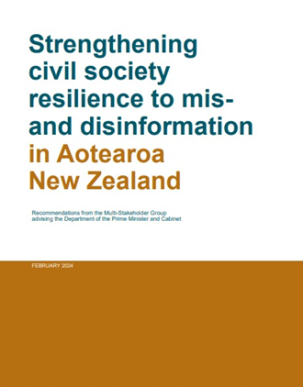
In July 2023, the Department of the Prime Minister and Cabinet convened a civil society Multi-Stakeholder Group to explore ways to strengthen all-of-society resilience to disinformation in New Zealand.
The group was drawn from across New Zealand, and made recommendations about what practices and structures could be developed to better understand disinformation and address its effects.
They were guided throughout by principles of transparency, lawfulness, and human rights, including protecting freedom of expression.
The Multi-Stakeholder Group’s final report included a range of viewpoints, but agreed on a shared goal:
“to mitigate the harm mis- and disinformation cause and to move towards ensuring that within New Zealand, people can agree and disagree in good faith, working off a mostly shared set of facts, and that when disputes occur – especially consequential disputes—they are possible to resolve with reference to trustworthy evidence.”
You can read the Multi-Stakeholder Group’s report by clicking on the link below:
Strengthening civil society resilience to mis- and disinformation in Aotearoa New Zealand
Government response
The report includes a number of recommendations on how to strengthen civil society resilience to disinformation. The Department of the Prime Minister and Cabinet has considered each recommendation and you can read our response to the report here:
The Department thanks the Multi-Stakeholder Group’s co-chairs and members for their valuable contribution to public discussion on disinformation, and broader changes in New Zealand’s information environment. Their report is available as a resource for all New Zealanders.
Group membership
Group members were drawn from various sectors in New Zealand society, including civil society, the private sector, academia, journalism, and the legal system. They were appointed for their individual experience, not as representatives of an organisation or community.
The Department of the Prime Minister and Cabinet convened the group and provided its secretariat, but was not a member.
The Disinformation Multi-Stakeholder Group included:
Andrew Cushen (Co-Chair) is a consultant with experience across strategy, policy and public affairs. He has a background in telecommunications and the internet, and brought perspectives on building effective and sustainable community initiatives to the group.
Robyn Kamira (Co-Chair) (Te Rarawa, Te Aupōuri, Tai Tokerau whānui) is the founder of Māori-owned technology consulting company Pāua Interface Ltd, delivering professional advice to Māori, government and NGO clients on data and digital projects, including those in security-related areas. She also has a background in research, Te Ao Māori, indigenous peoples, and information technologies, and brought perspectives on the adjacency of these combined sectors.
Brent Carey (Te Āti Awa) is the Chief Executive Officer at Netsafe. He is a lawyer with areas of interest in tech, privacy, public law and the internet. He has a background in working for integrity and self-regulatory bodies in both New Zealand and Australia, and brings perspectives on malinformation, trust and safety, compliance, and enforcement and internet governance.
Dr Mona Krewel is a Senior Lecturer in the School of History, Philosophy, Political Science and International Relations and the Director of the Internet, Social Media, and Politics Research Lab (ISPRL) at Te Herenga Waka Victoria University of Wellington. She has a background in political communication research, and her work focusses on social media effects on voting behaviour, and online dis- and misinformation. She brought expertise on the use of fake news, half-truths, and conspiracy theories in election campaigns to the group.
Vivien Maidaborn is the CEO of Internet New Zealand Ipurangi Aotearoa, and has experience in civil society, and multi-stakeholder processes and decision making. She has a background in digital equity, social change and the uses of online resources and information in forming social movements. Vivien brought perspectives on use of mis and disinformation to undermine vulnerable communities’ right to participation, and protection.
InternetNZ Ipurangi Aotearoa partnered with DPMC to deliver a one-off fund to catalyse and support community-based initiatives that build resilience against the harms of disinformation.
Jeremy Rees is an editor and journalist, currently Executive Editor at Radio New Zealand, and acting as Head of News during his time on the group. He is a former member of the Media Freedom Committee and has an interest in freedom of expression issues.
Paul Rishworth KC is a barrister at Britomart Chambers, Auckland, specialising in human rights law. His background includes research and teaching in public law at The University of Auckland Law School since 1987. He brought a legal perspective to the group’s work.
Dr Chris Wilson is a Senior Lecturer in Politics and International Relations at the University of Auckland, and director of Hate and Extremism Insights Aotearoa. He researches and teaches political violence of various forms, on how and why individuals and groups radicalise, including to violent action, and on how societies polarise and descend into violent conflict. He brought insights on these topics to the group, including how and why disinformation can proliferate and facilitate distrust, hate, intergroup tension, and violence.
Hate and Extremism Insights Aotearoa, was commissioned by the Department of the Prime Minister and Cabinet to research and analyse themes and trends in disinformation in New Zealand.
This is part of the civil society-led programme to strengthen national capacity and awareness on disinformation that DPMC led over 2023 - 2024. For more information about the other initiatives in this programme:
